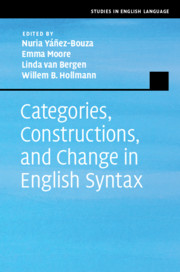Book contents
- Categories, Constructions, and Change in English Syntax
- Studies in English Language
- Categories, Constructions, and Change in English Syntax
- Copyright page
- Contents
- Figures
- Tables
- Contributors
- Acknowledgements
- Introduction: Analysing English Syntax Past and Present
- Part I Approaches to Grammatical Categories and Categorial Change
- Chapter 1 What Is Special about Pronouns?
- Chapter 2 What For?
- Chapter 3 Whatever Happened to Whatever?
- Chapter 4 Are Comparative Modals Converging or Diverging in English? Different Answers from the Perspectives of Grammaticalisation and Constructionalisation
- Chapter 5 The Definite Article in Old English: Evidence from Ælfric’s Grammar
- Part II Approaches to Constructions and Constructional Change
- Part III Comparative and Typological Approaches
- References
- Index
Chapter 1 - What Is Special about Pronouns?
from Part I - Approaches to Grammatical Categories and Categorial Change
Published online by Cambridge University Press: 07 October 2019
- Categories, Constructions, and Change in English Syntax
- Studies in English Language
- Categories, Constructions, and Change in English Syntax
- Copyright page
- Contents
- Figures
- Tables
- Contributors
- Acknowledgements
- Introduction: Analysing English Syntax Past and Present
- Part I Approaches to Grammatical Categories and Categorial Change
- Chapter 1 What Is Special about Pronouns?
- Chapter 2 What For?
- Chapter 3 Whatever Happened to Whatever?
- Chapter 4 Are Comparative Modals Converging or Diverging in English? Different Answers from the Perspectives of Grammaticalisation and Constructionalisation
- Chapter 5 The Definite Article in Old English: Evidence from Ælfric’s Grammar
- Part II Approaches to Constructions and Constructional Change
- Part III Comparative and Typological Approaches
- References
- Index
Summary
The observation that personal pronouns typically sound highly unnatural as the object in of-PP dependents of English noun phrases dates back at least to Lyons (1986: 136). In a table comparing the frames [NP’s N], [(Det) N of NP], and [(Det) N of NP’s], he systematically excludes accusative pronouns from the NP position in the second of these. We will employ the terms used by The Cambridge Grammar of the English Language (Huddleston and Pullum et al. 2002) for these three constructions: s-genitive, of-PP, and oblique genitive respectively.
- Type
- Chapter
- Information
- Categories, Constructions, and Change in English Syntax , pp. 25 - 53Publisher: Cambridge University PressPrint publication year: 2019

